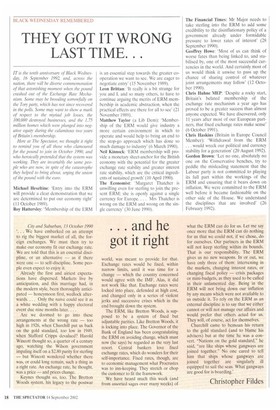. . . and he got it right
City and Suburban, 13 October 1990 . We have embarked on an attempt to rig the biggest market of all, the foreign exchanges. We must then try to make our economy fit our exchange rate. We are told that this is an essential discipline, or an alternative — as if there were one — to self-discipline. Some people even expect to enjoy it.
Already the first and airiest expectations have dispersed. Markets live by anticipation, and this marriage had, in the modern style, been thoroughly anticipated — honeymoon first, wedlock afterwards... . Only the naive could see it as a white wedding with a happy electoral event due nine months later.. . .
Are we doomed to go into these arrangements at the wrong rate — too high in 1926, when Churchill put us back on the gold standard, too low in 1949, when Stafford Cripps devalued? Harold Wincott thought so, a quarter of a century ago, watching the Wilson government impaling itself on a $2.80 parity for sterling — but Wincott wondered whether there was, or could long remain, such a thing as a right rate. An exchange rate, he thought, was a price — and prices change.
Keynes thought so, too. The Bretton Woods system, his legacy to the postwar
world, was meant to provide for that. Exchange rates would be fixed, within narrow limits, until it was time for a change — which the country concerned would agree with the IMF. Alas, it did not work like that. Exchange rates were locked into place, defended at high cost, and changed only in a series of violent jerks and successive crises which in the end brought down the system.
The ERM, like Bretton Woods, is supposed to be a system of fixed but adjustable parities. Like Bretton Woods, it is locking into place. The Governor of the Bank of England has been congratulating the ERM on avoiding change, which must now (he says) be regarded as the very last resort. Central bankers love fixed exchange rates, which do wonders for their self-importance. Fixed rates, though, are to economic management what Procrustes was to inn-keeping. They stretch or chop the customer to fit the framework.
We have heard much this week (and from assorted sages over many weeks) of what the ERM can do for us. Let me say once more that the ERM can do nothing for us that we could not, if we chose, do for ourselves. Our partners in the ERM will not keep sterling within its bounds. That is our responsibility. The ERM gives us no new weapons. In or out, we have only three of them: intervening in the markets, changing interest rates, or changing fiscal policy — crisis packages or mini-budgets, as they used to be called in their unlamented day. Being in the ERM will not bring down our inflation by any means which were not available to us outside it. To rely on the ERM as an external discipline is to say that we either cannot or will not manage our affairs and would prefer that others acted for us. They will, of course, act for themselves.
Churchill came to bemoan his return to the gold standard (and to blame his advisers) but at the time he was a convert. "Nations on the gold standard," he said, "are like ships whose gangways are joined together." No one cared to tell him that ships whose gangways are joined together are singularly ill equipped to sail the seas. What gangways are good for is boarding.'
Christopher Fildes










































































 Previous page
Previous page